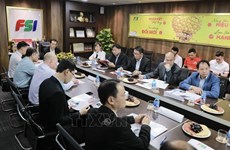Vietnamese scientists must take the initiative
Vietnam currently holds the lead among the Association of South East
Asian Nations (ASEAN) countries which have carried out many scientific
research and technological development projects in cooperation with the
European Union (EU). The success rate of EU-funded projects implemented
by Vietnam is higher than the average of all EU-funded projects. The
Vietnam Economic News reports.
Vietnam currently holds the lead among the Association of South East
Asian Nations (ASEAN) countries which have carried out many scientific
research and technological development projects in cooperation with the
European Union (EU). The success rate of EU-funded projects implemented
by Vietnam is higher than the average of all EU-funded projects. The
Vietnam Economic News reports.
At a recent international workshop "Strengthening EU-Vietnam Cooperation in Science, Technology and Innovation: Opportunities to Increase Researcher Mobility" in Hanoi, National Agency for Science and Technology Information Director Le Xuan Dinh said that Vietnam was engaged in 36 projects under the EU’s 7th Framework Program for Research and Technological Development (FP7) with EU funds totaling EUR5 million.
Vietnam takes the lead among the Southeast Asian countries which have had cooperation projects with the EU (the whole ASEAN region so far has had 98 cooperative research projects with the EU).
Vietnam is the second largest recipient of the EU funds, after Thailand. It is also the largest recipient of the EU’s Marie Curie individual fellowships. Fifty Vietnamese researchers have received these fellowships and joined in research activities at European universities and research institutes.
Dr. Simon Grimley, an Euraxess expert in Asia (Euraxess is a network of European and international researchers, scientists and scholars, which works on strengthening research cooperation between Europe and Southeast Asia), said that Vietnam not only took the lead among the ASEAN countries having cooperation projects with the EU but the success rate of EU-funded projects implemented by Vietnam was rather high, standing at 30 percent, while the average of all EU-funded projects was 17 percent. These are impressive results, reflecting Vietnam’s successful involvement in EU-funded projects.
Like other ASEAN members, Vietnam has taken an active part in EU-funded projects in a wide range of fields such as natural resources and environment, food, agriculture, biotechnology, renewable energy and health care.
However, in Dinh's opinion, Vietnamese scientists can find more opportunities to cooperate with the EU if they take the initiative in providing information about their research capabilities. Actually, the technical capabilities of Vietnamese researchers and those from other ASEAN countries are very good, but they still lack the capability of making the most of job opportunities.
“To work in science like people in the rest of the world, one cannot just sit in a research institute or a laboratory but must seek out opportunities to cooperate with others to undertake research so that one can improve in terms of skills and methodology and make use of modern research facilities to achieve the best research results,” said Dinh.
Grimley called upon Vietnamese scientists to come to Euraxess where they can be offered opportunities to seek cooperative research partners from Europe. The EU’s FP7 will finish later this year and the EU will develop another science and technology programme entitled Horizon 2020.
He also encouraged Vietnamese scientists to seek the EU’s Marie Curie individual fellowships to enjoy financial support throughout a 12-24 month research process.-VNA
At a recent international workshop "Strengthening EU-Vietnam Cooperation in Science, Technology and Innovation: Opportunities to Increase Researcher Mobility" in Hanoi, National Agency for Science and Technology Information Director Le Xuan Dinh said that Vietnam was engaged in 36 projects under the EU’s 7th Framework Program for Research and Technological Development (FP7) with EU funds totaling EUR5 million.
Vietnam takes the lead among the Southeast Asian countries which have had cooperation projects with the EU (the whole ASEAN region so far has had 98 cooperative research projects with the EU).
Vietnam is the second largest recipient of the EU funds, after Thailand. It is also the largest recipient of the EU’s Marie Curie individual fellowships. Fifty Vietnamese researchers have received these fellowships and joined in research activities at European universities and research institutes.
Dr. Simon Grimley, an Euraxess expert in Asia (Euraxess is a network of European and international researchers, scientists and scholars, which works on strengthening research cooperation between Europe and Southeast Asia), said that Vietnam not only took the lead among the ASEAN countries having cooperation projects with the EU but the success rate of EU-funded projects implemented by Vietnam was rather high, standing at 30 percent, while the average of all EU-funded projects was 17 percent. These are impressive results, reflecting Vietnam’s successful involvement in EU-funded projects.
Like other ASEAN members, Vietnam has taken an active part in EU-funded projects in a wide range of fields such as natural resources and environment, food, agriculture, biotechnology, renewable energy and health care.
However, in Dinh's opinion, Vietnamese scientists can find more opportunities to cooperate with the EU if they take the initiative in providing information about their research capabilities. Actually, the technical capabilities of Vietnamese researchers and those from other ASEAN countries are very good, but they still lack the capability of making the most of job opportunities.
“To work in science like people in the rest of the world, one cannot just sit in a research institute or a laboratory but must seek out opportunities to cooperate with others to undertake research so that one can improve in terms of skills and methodology and make use of modern research facilities to achieve the best research results,” said Dinh.
Grimley called upon Vietnamese scientists to come to Euraxess where they can be offered opportunities to seek cooperative research partners from Europe. The EU’s FP7 will finish later this year and the EU will develop another science and technology programme entitled Horizon 2020.
He also encouraged Vietnamese scientists to seek the EU’s Marie Curie individual fellowships to enjoy financial support throughout a 12-24 month research process.-VNA













